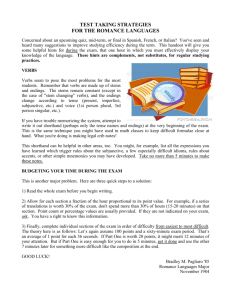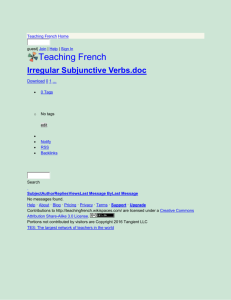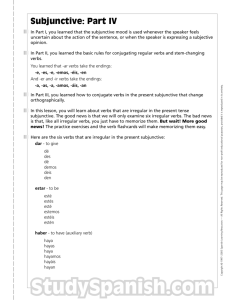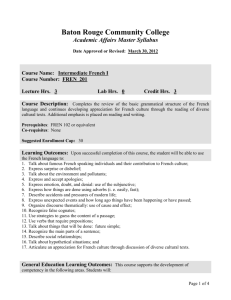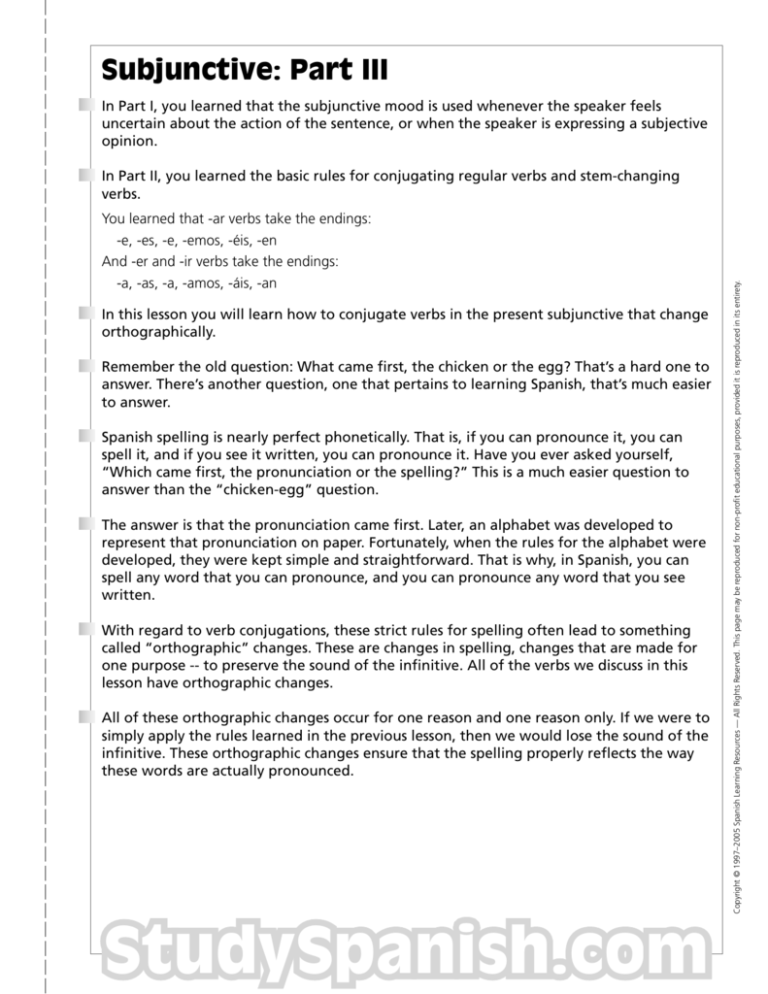
Subjunctive: Part III
In Part I, you learned that the subjunctive mood is used whenever the speaker feels
uncertain about the action of the sentence, or when the speaker is expressing a subjective
opinion.
You learned that -ar verbs take the endings:
-e, -es, -e, -emos, -éis, -en
And -er and -ir verbs take the endings:
-a, -as, -a, -amos, -áis, -an
In this lesson you will learn how to conjugate verbs in the present subjunctive that change
orthographically.
Remember the old question: What came first, the chicken or the egg? That’s a hard one to
answer. There’s another question, one that pertains to learning Spanish, that’s much easier
to answer.
Spanish spelling is nearly perfect phonetically. That is, if you can pronounce it, you can
spell it, and if you see it written, you can pronounce it. Have you ever asked yourself,
“Which came first, the pronunciation or the spelling?” This is a much easier question to
answer than the “chicken-egg” question.
The answer is that the pronunciation came first. Later, an alphabet was developed to
represent that pronunciation on paper. Fortunately, when the rules for the alphabet were
developed, they were kept simple and straightforward. That is why, in Spanish, you can
spell any word that you can pronounce, and you can pronounce any word that you see
written.
With regard to verb conjugations, these strict rules for spelling often lead to something
called “orthographic” changes. These are changes in spelling, changes that are made for
one purpose -- to preserve the sound of the infinitive. All of the verbs we discuss in this
lesson have orthographic changes.
All of these orthographic changes occur for one reason and one reason only. If we were to
simply apply the rules learned in the previous lesson, then we would lose the sound of the
infinitive. These orthographic changes ensure that the spelling properly reflects the way
these words are actually pronounced.
StudySpanish.com
Copyright © 1997–2005 Spanish Learning Resources — All Rights Reserved. This page may be reproduced for non-profit educational purposes, provided it is reproduced in its entirety.
In Part II, you learned the basic rules for conjugating regular verbs and stem-changing
verbs.
Remember, pronunciation comes first. Spelling merely reflects the way a word is
pronounced. Here are the rules for the orthographic changes in the present subjunctive:
For verbs that end in -zar, the z changes to c when it comes before the letter e.
empezar (e:ie)
empiece
empieces
empiece
empecemos
empecéis
empiecen
For verbs that end in -ger or -gir, the g changes to j when it comes before the letter a.
escoger
escoja
escojas
escoja
escojamos
escojáis
escojan
elegir (e:i)
elija
elijas
elija
elijamos
elijáis
elijan
For verbs that end in -guir, the gu changes to g when it comes before the letter a.
seguir (e:i)
siga
sigas
siga
sigamos
sigáis
sigan
For verbs that end in -car, the c changes to qu when it comes before the letter e.
buscar
busque
busques
busque
busquemos
busquéis
busquen
StudySpanish.com
For verbs that end in -gar, the g changes to gu when it comes before the letter e.
pagar
pague
pagues
pague
paguemos
paguéis
paguen
huya
huyas
huya
huyamos
huyáis
huyan
There is just one more consideration for conjugating verbs in the present subjunctive. We
will cover that in the next lesson.
Let’s add flashcards for the verbs that change orthographically in the present subjunctive:
Verb Flashcards
65. -zar: z changes to c before e
(present subjunctive)
empezar (e:ie)
empiece
empieces
empiece
empecemos
empecéis
empiecen
55. -ger or -gir: g changes to j before a
(present subjunctive)
escoger
escoja
escojas
escoja
escojamos
escojáis
escojan
StudySpanish.com
Copyright © 1997–2005 Spanish Learning Resources — All Rights Reserved. This page may be reproduced for non-profit educational purposes, provided it is reproduced in its entirety.
For verbs that end in uir, add the letter y before the letter a.
huir
56. -guir: gu changes to g before a
(present subjunctive)
seguir (e:i)
57. -car: c changes to qu before e
-gar g changes to gu before e
(present subjunctive)
buscar / pagar
busque / pague
busques / pagues
busque / pague
busquemos / paguemos
busquéis paguéis
busquen / paguen
58. uir: add y before a
(present subjunctive)
huir
huya
huyas
huya
huyamos
huyáis
huyan
StudySpanish.com
Copyright © 1997–2005 Spanish Learning Resources — All Rights Reserved. This page may be reproduced for non-profit educational purposes, provided it is reproduced in its entirety.
siga
sigas
siga
sigamos
sigáis
sigan

